MercoPress. South Atlantic News Agency
Fisheries
-
Tuesday, August 9th 2011 - 12:47 UTC
Invasive Asian mollusc advances along Argentine coast threatening food chain
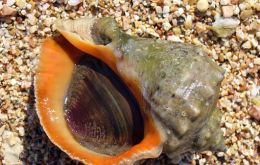
An invasive Asian mollusc, Rapana Venosa, is rapidly expanding along the Argentine coastline threatening local ecosystems and fishing activities according to Argentine marine biologists from the National Council for Scientific and Technical Research, Conicet.
-
Saturday, August 6th 2011 - 00:15 UTC
Falklands refuses refund request from fishing companies on ‘value of catch’

Some fishing companies are feeling “a bit hard done by” having been caught out by a change in the Falkland Islands Government Fisheries Department refunds policy implemented for 2011, said Director of Fisheries John Barton.
-
Monday, July 25th 2011 - 12:06 UTC
Argentina/Uruguay agree TACs for sharks and rays in common fishing zone
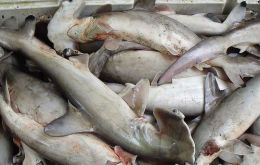
Argentina and Uruguay have agreed on total allowable catches (TAC) of 4,000 tons and 9,000 tons for smooth-hound shark (Mustelus spp.) and ray (Rajidae) in the Common Fishing Zone (CFZ), which is shared by the neighbouring countries.
-
Friday, July 22nd 2011 - 06:12 UTC
Uruguay-Argentina agree 60-day hake ban on CFZ fearing ‘bio-hazard’ status
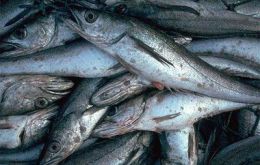
The Joint Technical Commission for Maritime Front (CTMFM) ordered a 60-day winter ban on hake (Merluccius hubbsi) in the Argentina-Uruguay Common Fishing Zone (CFZ), effective August 1 until September 30.
-
Tuesday, July 19th 2011 - 13:12 UTC
Chile debates how to avoid repeat of the deadly ISA that devastated the salmon industry
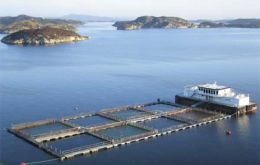
Fear of yet another outbreak of Infectious Salmon Anaemia (ISA) — an infectious viral disease found in Atlantic salmon — has sparked new debate in Chile’s salmon industry about what kind of regulatory safeguards are most needed.
-
Wednesday, July 13th 2011 - 16:35 UTC
Europe unveils plan to reform fishing industry and phase out ‘discards’

European Commission has unveiled major plans to reform the EU fishing industry and stop catches being wasted. The proposal, due to take effect from 2013, would give fleets quota shares guaranteed for at least 15 years.
-
Tuesday, July 12th 2011 - 03:47 UTC
South Georgia mentioned as example of longline fisheries seabirds protection

A new global estimate of the impact of longline fisheries on seabirds reveals that, despite efforts to reduce seabird deaths, upwards of 300,000 birds are still being killed every year. However South Georgia is praised for having imposed strict regulations that have seen seabird deaths as bycatch drop by 99%.
-
Tuesday, July 12th 2011 - 03:42 UTC
Squid landings in Argentina double, but from a very low 2010 floor
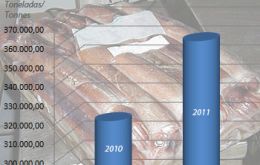
Fisheries catches landed in Argentine ports totalled 356.304 tons in the first six months of 2001 which represents a 13.3% over the 314.338 tons of the same period a year ago. However, squid landings in the same period doubled but from a very low 2010 floor, according to the latest data from the Under Secretariat of Fisheries and Aquaculture.
-
Wednesday, July 6th 2011 - 20:30 UTC
Luxembourg group becomes third largest share holder of Spain’s Pescanova

Pescanova president, Manuel Fernández de Sousa-Faro, decided to sell 5.1% of the company's stake to Luxempart investment group for EUR 29.76 million.
-
Tuesday, July 5th 2011 - 16:29 UTC
How seafood, oil and tourism made ’squidionaires’ and the Falklands’ rich

Caroline Graham from London's Mail on Sunday visited the Falkland Islands for a week and chance had it she arrived when a commercial oil strike was announced by one of the several companies exploring offshore the Islands.
